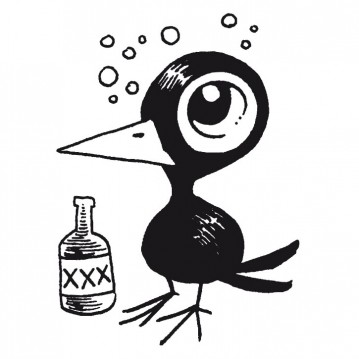
April 21, 2015
 Go, Read: Evan Serpick On Baltimore’s Alt-Weekly Dropping Tony Millionaire’s Maakies
Go, Read: Evan Serpick On Baltimore’s Alt-Weekly Dropping Tony Millionaire’s Maakies

Tony Millionaire's
Maakies was dropped from Baltimore's
CityPaper, the syndicated strip's longest-running client and one of only a handful of clients remaining for the feature.
Evan Serpick writes at length about that decision here.
It's a bit all over the place, offering up criticism of specific strips while also declaring it just not funny anymore and tired in the general, describing its ideas as old-fashioned but also as current mainstream. I appreciate him putting ideas to paper, though. It gives us a lot to think about.

I think where Serpick's piece is most lucid is in the simple fact that they're not obligated to run anything they don't want to and there has been a generational shift at most of those publications where they're going to be stridently disinterested in running certain kinds of humor. I think this is going to become increasingly true of most comics institutions, including cons/festivals and publishers.
I think the worst element is the general cluelessness about the living that cartoonists make from a strip, and the resulting dismissiveness with which he treats Millionaire's concern about losing a client.
One of the distorting factors in this piece and others like it is that a real-world decision like this one gets played out on the Internet, where it becomes about winning the arguments involved rather than working one's way through the issues or even just making a declarative statement and moving on. I think that's part of why Serpick's arguments about the decision to drop
Maakies get jumbled, because there seems to be a requirement that when something crops up about which there's some question, you need to win all of the arguments as strongly as possible.
As for Millionaire's work, I've never read it the way that Serpick and his staffers are reading it. For instance, I thought Netflix's
Daredevil was a greater endorsement for alcohol abuse than Millionaire's ridiculous puke-a-arama has been, and heavy drinking is the first thing I think of when I think of that strip. I don't think
Maakies endorses wife-beating or suicide. I think its lunacy helps rob those things of their hurtful power, makes them ugly and dumb and small: streakmarks in Hitler's underwear. I think there's a great deal to consider in its consistent evocation of horrifying, chaotic details seen in close-up contrasted with its far-removed scenes of impressive beauty: sailings ships and pretty houses and seaside villages. I will buy
Maakies and likely enjoy it until he stops making it.
In general, I think art can exist that shows abominable behavior that doesn't endorse that behavior. I think that can be true even though some people take it that way, and I think that's true even if some people decide that what they're seeing is awesome. Lot of frat boys love
South Park. Lot of corporate ad-men liked
MAD. I watched a very different
Sopranos than my high school buddies seemed to. How much the endorsement of behavior is caused by bad art or simply by being art, that's been an open issue of comics going back to
Watchmen at least, when some fans started to get behind Rorschach despite his creators' horror that this was so and in fact intended the opposite reaction.
Certainly my view of
Maakies could be a function of my own privilege to the detriment of the clarity of that view. That's always a possibility. I'm an inability to put down a hot dog away from dialing up three peaches on the slot machine of life. I'll continue to try to process that as best I can. It could also be that my take is dumb, or wrong. I'm perfectly capable of those things.
What I hope for is space for all the different approaches, and I am personally in favor of at least a consideration of motive and intent and history when dealing with how art is processed, what we say and perhaps even how we think about it. I've always thought so of our near industry-wide fellatio-style relationship with violence as a solution. I've thought so with political cartoons. I've thought so with comic books.
So I guess my biggest break with what Serpick writes is that I would never have conceived their publishing Tony Millionaire as an endorsement of his approach except maybe in the broadest terms -- we think this is worth publishing -- so it's weird for me to think of their not-publishing Tony Millionaire as a repudiation of his approach beyond them just opting out of thinking it's worth publishing. It would be up to me if I were a reader to decide what that said about the magazine and if I wanted to continue reading. The same would apply to those working there or those who have them as clients.
I hope that editors will feel free to run material without feeling like they're endorsing it, because I think that serves most journalistic missions more effectively. I bet that's something close to the philosophy that
CityPaper takes to running ads on their site for an adult nightclub that some folks might find objectifying and soul-destroying. Other than that, I'm not sure there's an argument to be won, although because it's the Internet we'll try. There was an action. There's a backlash. There's a few more backlashes to come. And then either another decision or not.
posted 12:25 am PST |
Permalink
Daily Blog Archives
November 2019
October 2019
September 2019
August 2019
July 2019
Full Archives


